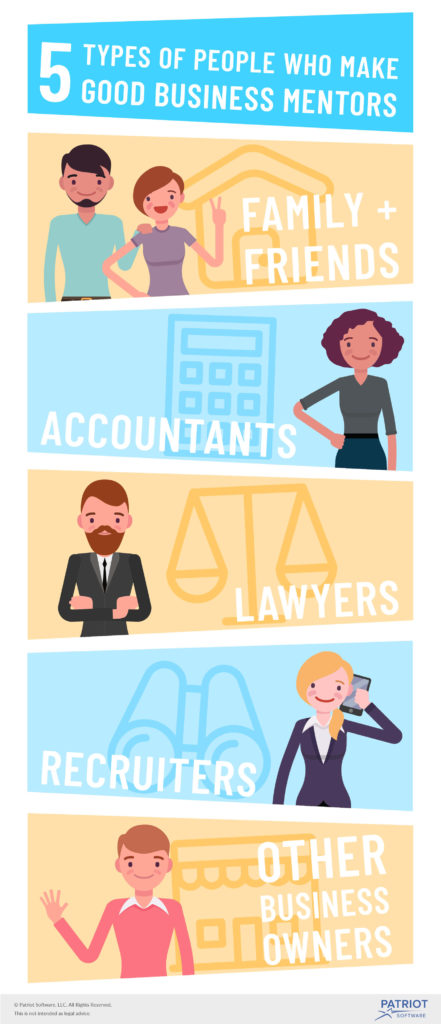This column was originally published on Entrepreneur.com on 7/3/2017.
Before you fulfill your dream of being a small business owner, you’ll need some help getting started. For small business mentoring, seek personal and professional expertise.
When I first started a business, I didn’t always know who to turn to for guidance when I had questions. Understanding that you need small business advisors for handling business-related questions is your first step in the right direction.
Where to find a business mentor.
Looking for a mentor in business? You might enlist the help of some different advisors — accountant, lawyer, recruiter. It’s also a good idea to talk to your family and other business owners before getting started.
Taking advantage of experts in small business mentoring can save you time and put your mind at ease. Don’t be afraid to ask for advice. Take a look at the types of people who can help you start a business and why finding a mentor in business (or two or three) is a good idea.

1. Family and friends
Family can give you great support and mentoring. If you’re wondering how to find a mentor in business, your family might be a great place to start.
My hero, mentor and strongest business advisor has always been my dad. Throughout his career, he was an experienced entrepreneur, a licensed professional engineer, a holder of multiple patents and a successful business executive with more than 1,000 employees. He knew business inside and out.
When I first went to my dad with my business idea, his advice wasn’t about what I needed to do to plan my business. His advice was actually that I shouldn’t start a business at that time since I was about to be married. My dad’s mentorship was all about evaluating the risk of me quitting my job and starting a business with a growing family.
My dad asked me basic questions about what type of business I intended to start. As is with most entrepreneurs, my plan was sketchy. In fact, I didn’t really have a plan at all. His questions prompted me to develop a game plan, and I took on a business partner, one of my best friends since childhood.
You might not know business savvy folks. But, your family knows you. They know your personality, work habits, life circumstances and what makes you happy. Family can help make decisions.
2. Accountants
Accountants are one of the first people you should turn to for small business mentoring. They can suggest ways to fund your business and prepare financial proposals. If you need help creating a business budget, accountants have you covered.
When your business starts bringing in revenue, accountants can determine the financial health of your business. They can measure your business’s performance and come up with ways to help your company if it is underperforming.
If you have employees, accountants can help with setting up payroll and handling taxes.
3. Lawyers
For a startup, lawyers are small business advisors you don’t want to forget about. A lawyer can help you establish your business structure, put together a solid business plan and help register your business. Lawyers can also help you buy a business, aid you with startup financing, ensure you have the right licensing to run your business and make sure your business’s intellectual property is protected. When you start making sales, a lawyer can collect money if a customer refuses to pay you.
Make sure you hire a lawyer who specializes in small businesses.
4. Recruiters
If you’ve decided you want to hire employees but don’t know where to start, consider turning to recruiters.
You might not know the type of employee you need at your startup. How much education and experience should they have? What skills are necessary for the job? Talk with a recruiter who’s experienced in your industry about your business needs.
A recruiter can help you put together a detailed job description to attract the right candidates. They can help throughout the recruitment process to source and screen applicants. When you interview candidates, make sure the recruiter is present. That way, you can ask them their professional advice on who would be the best fit for your business.
5. Other business owners
Naturally, we look up to those who represent the things we aspire to be. When I was a freshman in college, my mentor was a guy in his senior year. I wanted an upperclassman who was on track to accomplish exactly what I wanted to accomplish to be my mentor. I watched his successful habits, listened to his advice and tried to emulate what he did. In business, learn from seasoned business owners who have been in your shoes. They know what you’re going through and what you need to do. Business owners have a different perspective than the other professional mentors.
Ask business owners who specialize in the same niche as your startup if they have any tips. Business owners in your market know about accountants, lawyers and recruiters who might be a good fit for your needs. They can make recommendations and point you in the right direction.
Reach out to competing businesses. If you brand yourself as a friendly competitor, you can build a mutually-beneficial relationship with competitors. As a startup, developing relationships with your competitors can give you the support you need.
Other business owners in your locality can show you the ins and outs of running a business. They can talk about issues they have faced with the local economy, provide tips on how to market and give you an idea of when the busiest seasons are.
When you talk to other business owners, you build a network of mentors. Their wisdom is invaluable, especially for a startup.



